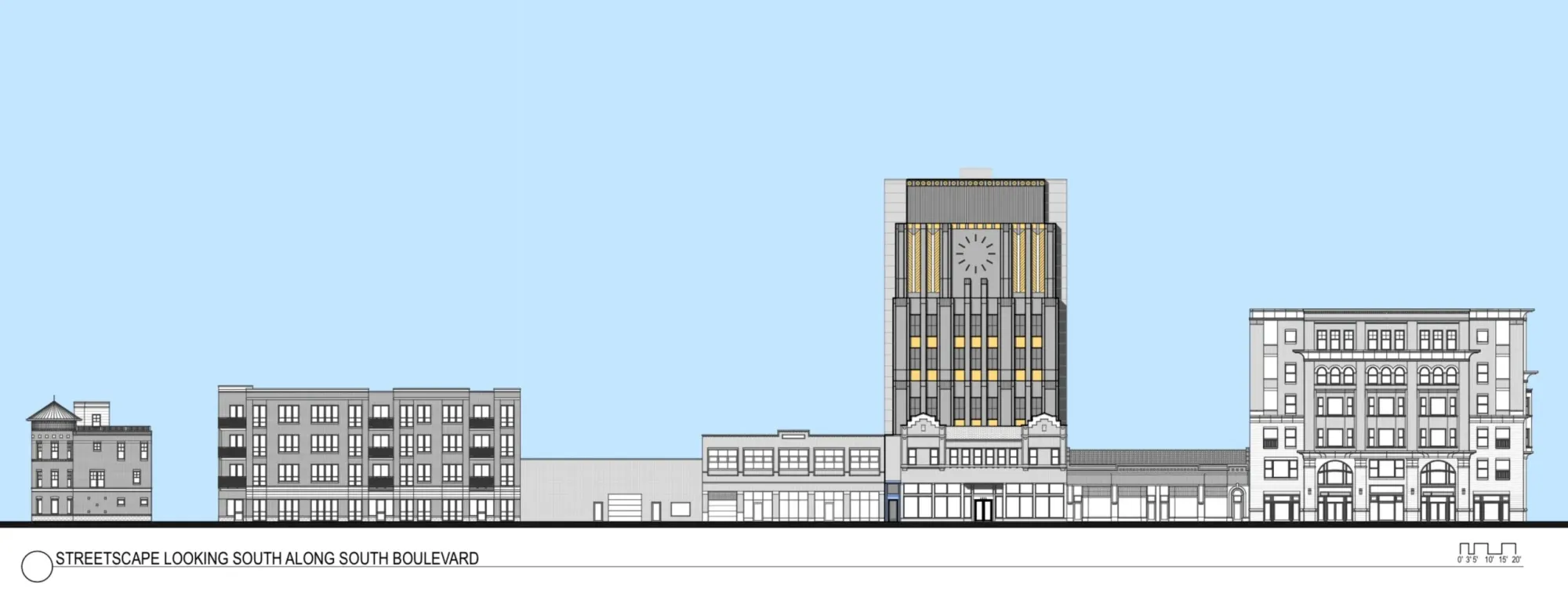The HPC Isn't Oak Park's HOA

Nobody elected the Oak Park Historic Preservation Commission.
Opponents of new housing in Downtown Oak Park are in a tizzy. The Village Board has voted to allow planning to continue for a new apartment development, disagreeing with the Historic Preservation Commission (HPC) in the process. Preservationists feel the board oversteps when it "overrules" the experts on the HPC.
But these folks misconstrue the role of the HPC. The issue is much bigger than a single board vote. In fact, it’s even more important than the contest between preservation and affordability. It’s about who determines the future of Oak Park: the experts, or the voters.
The HPC doesn’t get to decide what does and doesn't get built in Oak Park.
What Happened
The Boulevard Arcade building is a 2-story commercial space on South Blvd. It's where the Kribi Coffee was, next to Victory Italian and across from the train station on one side and Carnivore on the other. Oak Park designated it a historic landmark in 2007.
Behind that building is a parking lot. The lot owners, working with veteran Oak Park architect John Schiess, propose to replace it with a 24-unit apartment building (with garage spots). If you want to skip the rest of this section, I'll sum it up: the HPC objected.
Of course, the parking lot itself isn’t a historic landmark. It merely has the misfortune of being near one. It also happens to be close to the Opera Club Luxury Condominiums, a large multiunit building whose residents have organized to oppose the development.
Schiess brought his proposal to the HPC, as required, because of its proximity to the Boulevard Arcade landmark. The HPC unanimously refused to grant a Certificate of Appropriateness (COA). He appealed to the HPC (also required by our ordinance, before bringing a proposal to the board). The HPC re-refused.
A procedural error then forced the developers to do it all over: present a 3rd time before the HPC, which re-re-refused, and then appeal, for a re-re-re-refusal.
When the developers finally made it before the Village Board, the trustees voted 6-1 to disregard the HPC's COA rejection and allow the proposal to proceed through the planning process.
The Nerve Of Those Trustees
If you think the HPC's job is to decide what does or doesn't get built near historic landmarks, it's easy to see why this is problematic. The HPC is composed of historic preservation experts; the Village Board is not. The board has, in this view, overruled its own experts.
But that's not what happened. It's not HPC's responsibility to decide what gets built. Their job begins and ends with informing the board of the historic preservation impact of a proposed development. That's all.
Like in any municipality, the Board of Trustees of the Village of Oak Park weighs many competing values in making decisions, including:
- Public safety
- Environmental impact
- Traffic
- Housing affordability (a nationwide crisis felt acutely in Oak Park, where the median single-family home lists for half a million dollars)
- Historic preservation
- Equity and accessibility
- Commercial and property tax revenue
Preservation is just one of these values. But it has its own ordinance and a commission and a hearing process attached to it. So it's easy to miss that it's a value we balance against many others.
How do we perform that balancing act? By electing trustees. That means decisions are accountable to the voters, which is how our governments are supposed to work. But for some housing opponents, democracy isn’t enough. Instead, they believe a panel of appointed preservation experts is owed deference from the board, in effect weighing preservation above all other values.
As an appointed commissioner myself, I find that argument risible.
What Isn't Happening Next
The board’s last vote doesn't mean the developers get to go build. The project has cleared just one procedural hurdle: the HPC has registered its discontent, and the Village Board has acknowledged it while allowing planning to proceed. Historic preservation alone can't hold back badly needed housing anymore. But other factors might!
Over four HPC hearings, both public commenters and HPC commissioners made it clear that they had concerns far beyond preservation, including traffic, safety, and, somehow, diversity in Oak Park (which is improved by more housing).
The bad news for the HPC is that traffic, safety, and diversity are none of the business of the HPC. The good news is that they'll have the same opportunity all the rest of us get to voice those concerns, as public commenters in the Planned Development Process.
We look forward to seeing them at the meetings, disagreeing with the comments we'll be providing in support of the development.
[Click here for some additional fun facts about this development.]
